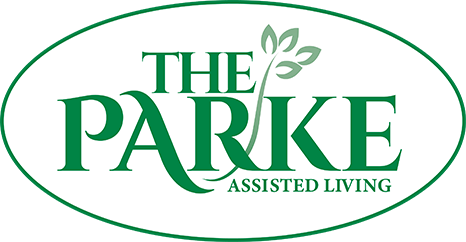As people age, nutritional needs change and it becomes even more important to eat a balanced, nutrient-rich diet daily. Unwanted physical symptoms can be avoided when an aging parent gives their body proper nourishment.
Healthy aging includes an active lifestyle, and in order to enjoy activities and independence, the right fuel is needed. Just as it is important to keep a car well fueled so it can perform optimally and get us where we need to go, it’s vital that our aging loved ones prioritize healthy eating. The Parke Assisted Living offers seniors a safe, caring community with nourishing meals to enjoy with others in a warm and welcoming dining area.
Here are some healthy eating tips, foods, vitamins and minerals seniors should include daily.
1. Hydrate with lots of liquids
Our aging parents need to drink water frequently throughout the day. And they should limit beverages that have high sugar or salt content. Health experts encourage people to divide their weight by 2 and then drink that number of ounces of water per day. For example, if someone weighs 130 pounds, they should drink 65 ounces of water per day to stay well hydrated.
2. Vary your veggies
Seniors should try to eat a rainbow of colored vegetables daily. The various colors, textures, and flavors of veggies provide nutrient dense mouthfuls for seniors.
3. Prioritize protein rich foods
Aging can cause muscles to weaken. Adequate amounts of protein can help seniors reduce age related muscle deterioration.
Protein from quality sources such as fish, beef, chicken, eggs, or legumes can help seniors build and repair tissues, as well as make enzymes and hormones. Protein is a vital building block for bones, muscles, cartilage, skin, and blood.
4. Curb Carbohydrates
These macronutrients are found in foods such as sweet potatoes and grains like rice and quinoa. And they function as a source of energy for the body’s cells. They provide fuel for the cells, promote heart health, aid in weight loss, boost mood, and increase energy. Carbs should be eaten in moderation. Foods high in carbs and added sugar can have a negative effect on the health of our aging parents.
5. Help promote healthy digestion with high fiber foods
Fiber can help promote optimal digestion and guard against kidney stones, diverticulosis, and constipation. They promote healthy weight loss and support blood sugar control. Some of the best sources include avocados, berries, coconuts, figs, artichokes, peas, okra, acorn squash, brussels sprouts, black beans, chia seeds, chickpeas, lentils, nuts, and flax seeds. Fiber supplements can also help our aging parents stay healthy.
6. Don’t let dental situations deter eating
If your loved one finds it difficult to chew various foods, find healthy ways they can still get the nutrients they need. Cooked vegetables are always easier to ingest rather than raw salads. And canned or blended fruit, soup, and fish are all easier to ingest than other foods.
7. Practice portion control
In order to maintain a healthy weight, it’s vital that our aging parents watch their portion size. When dining out, it’s hard not to overeat. Ask for a to-go box and encourage your loved one to enjoy part of their meal the following day.
8. Make mealtime meaningful
Join your loved one for a meal in the assisted living community dining area. Get to know their friends as you dine together in the assisted living community. Or, take your parent out to enjoy healthy options at their favorite restaurant.
9. Ask your doctor about dietary supplements
Since some supplements can impact the effectiveness of medications, your aging parent should check with their doctor before taking any dietary supplements. Here are some supplements that can often benefit seniors:
Calcium
This is an essential for strong bones, teeth, and healthy gums. Some of the best sources include dairy, leafy greens, and sardines. The RDA is 1200 mg a day, and it is most beneficial to take calcium with magnesium and vitamin D. Calcium deficiency can cause seniors difficulties like fragile bones or osteoporosis. Supplementing with calcium is an easy and convenient way to meet the body’s daily requirements.
Magnesium
A leading nutrient deficiency in adults (over 80% are deficient). A daily magnesium supplement along with magnesium rich foods can work together to meet the body’s needs. Magnesium is involved in over 300 biochemical functions in the body including regulating heart rhythms, energy production, metabolism, preventing constipation, assisting neurotransmitter function, and more. It is obtained from foods like spinach, potatoes, black beans, avocados, and almonds. Men should take 420 mg a day, and women should take 320 mg a day.
Fish Oil
Fish oil is a rich source of omega-3 fatty acids. For optimal brain function, and to slow down cognitive decline, seniors should take a daily dose of fish oil. It helps lower the risk of heart attack, stroke, and other cardiovascular health issues. It also lowers the risk of depression, hypertension, joint pain, and arthritis.
Vitamin D3
Although vitamin D can be obtained from sun exposure, most seniors aren’t out in the sun enough to get their daily needs of this important vitamin. Easy to take vitamin D3 enhances mental health, improves immune function, boosts bone strength, and can even promote weight loss. It can be found in foods such as salmon, mackerel, tuna, sardines, beef liver, and eggs.
When it comes to meal planning, The Parke Assisted Living listens to the input of residents. The Parke’s Food Committee meets regularly to discuss what they would like to have on their menu. The dining service director sits in on the food committee meetings and takes the desires of the residents into consideration when meal planning.
Schedule a Tour of The Parke Assisted Living Community
The Parke is one of the most beautiful assisted living communities in the Tulsa area. Schedule a tour and learn why so many families appreciate the nutritious meals, fun activities, and genuine care this attractive assisted living community offers.

